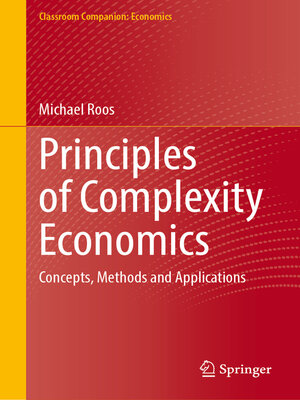Principles of Complexity Economics
ebook ∣ Concepts, Methods and Applications · Classroom Companion: Economics
By Michael Roos

Sign up to save your library
With an OverDrive account, you can save your favorite libraries for at-a-glance information about availability. Find out more about OverDrive accounts.
Find this title in Libby, the library reading app by OverDrive.



Search for a digital library with this title
Title found at these libraries:
| Library Name | Distance |
|---|---|
| Loading... |
This textbook serves as an introduction to the rising field of complexity economics. In thirteen chapters, it provides a comprehensive and systematic overview of the concepts and methods of complexity economics and their applications to economic issues. The book explains that the complexity approach is not just another method, but a worldview that is different from the one of academics with neoclassical training. By contrasting complexity economics with neoclassical economics, the readers are induced to reflect on their own unconscious beliefs about the economic world and develop their own approach to dealing with the pervasive complexities and uncertainties of reality. The first five chapters serve as an introduction and overview. Chapters 6 - 12 present the core concepts of the book. Each of the seven chapters introduces a key concept of complexity and provides applications to economics topics. The final chapter discusses the implications of complexity thinking for economic policy and for the future development of economics.
This textbook addresses advanced undergraduate students and graduate students of economics, interested in a better understanding of the concepts and the way of thinking in complexity economics, as well as in acquiring a sound technical foundation to understand most of the research literature.
This textbook addresses advanced undergraduate students and graduate students of economics, interested in a better understanding of the concepts and the way of thinking in complexity economics, as well as in acquiring a sound technical foundation to understand most of the research literature.







